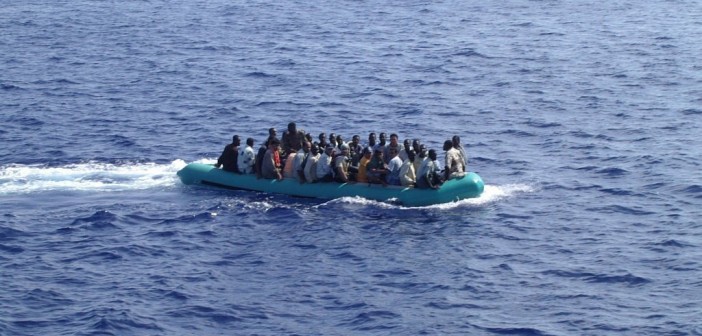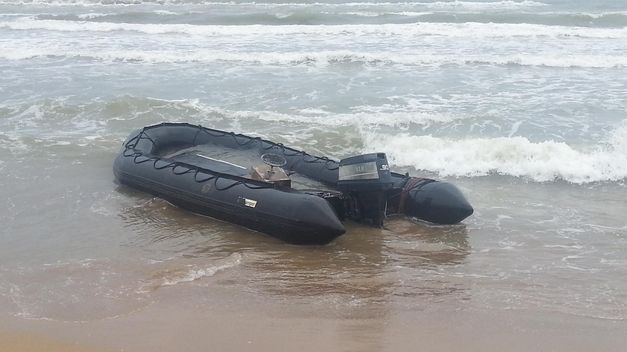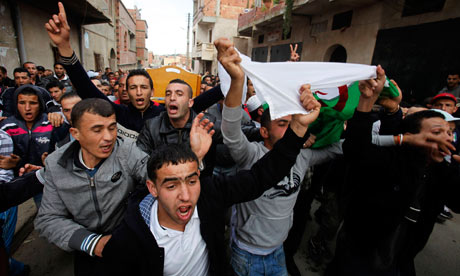Who are they?
‘Harraga’ is an Arabic term that means ‘path burner’, and defines people from countries along the Mediterranean coast of North Africa, particularly Algeria, who attempt to cross the Strait of Gibraltar on rafts, or in makeshift boats called ‘patera’. They leave in the middle of the night and make their way across the open sea with the intention of reaching Mediterranean European countries and islands controlled by Europe. The boats are equipped with jerrycans of fuel, food, blankets, an outboard motor and a GPS tracking device. They can hold from 10 to 12 people each, but often carry more. The Harragas sometimes move on to other European countries, and traditionally burn their immigration papers if they are about to be taken captive. Sidi Salem is the preferred launch pad, as Sardinia is only 12 hours away by boat from there, if the weather is good.
Why do they do this?
Of course, the act of crossing the ocean in makeshift boats is extremely dangerous, and the death rates are high. However, the incredible poverty and political strife throughout North Africa incentivizes the youth generation to attempt a fresh start in Europe. Algerian opposition leader Abdallah Djaballah gave an apt description of the stagnant economic situation in the country so rife with nepotism and corruption, suggesting that young people must choose “between death at sea and a slow, gradual death at home”. The Harraga lifestyle isn’t simply a mode of nomadic culture, because it is predicated on a sense of deep-seated indignation, hopelessness, and a desire for individual autonomy. Indeed, some Harragas are so intent on escaping Africa that once they reach Europe, they change their gender or religion to gain European citizenship.
Inevitable Problems
In 2009, the Algerian government made secret emigration punishable by fines and 2 – 6 months in prison. Security has been increasingly ramped up, with boats and helicopters swarming the country’s 1,200km. shoreline, particularly at night. Moreover, the Algerian Ministry of Religious Affairs issued a Fatwa (a legal pronouncement relating to a specific issue) against those who try to cross the border illegally. 14,000 mosques were instructed to preach against clandestine emigration. However, this has not deterred the Harragas from trying to escape.
Indeed, Rachid, a Harraga with a badly-paid job as a security guard, has already attempted to escape Algeria three times. He crossed the Mediterranean twice, to Sardinia. On the first escape, he stayed in Europe for eight months and worked in a halal butcher’s shop in France, before being intercepted by French police and sent home. The second time, he was sent back home from Italy after 55 days. Rachid commented: “The carabinieri told us that our President Bouteflika had paid 4,500 euros (£3,175) for each of us to be returned and put us on a plane home. I felt so depressed.”
Though Rachid’s situation is not as desperate as it could be – he does have a home and a source of income – his situation is undeniably dismal. He claimed that he feels that his life is passing him by, stating “What kind of future can I have here in Algeria. There’s nothing for me here”. Though Algeria is one of the more peaceful countries on the continent, boasting huge oil and gas reserves as well as free healthcare and education, it is tightly controlled by an elite class of men over the age of 70. Consequently, the country’s young people, who make up most of the population, feel that there is no scope for change.
Typically, Harragas spend long periods behind bars upon capture. Kourceila Zerguine, a lawyer in Annaba, commented: “Our prisons can’t accommodate all the hundreds of Harragas who are arrested each year. This law was imposed by the authorities under pressure from Europe. Algeria has become a guard dog for ‘Fortress Europe’.”
There doesn’t seem to be official stats showing how many Harragas try to leave.
Clandestine Immigration in Popular Culture
Harragas culture has been cited as a “national obsession” as it is the focus of Algerian media, cinema, and popular music. Azzedine Nebil (Azzou) is one of Algeria’s most famed hip-hop artists, and has repeatedly protested against the illegal crossings. His song ‘Harraga‘ recounts a journey to Sardinia that almost ended in death. The lyrics describe a watery death trap, a waterlogged boat, and a group of youths who “[look]death in the face” before they are rescued.
Azzou commented: “When I perform this song at concerts, so many people are in tears. I have a friend, a boy I grew up with, who disappeared at sea, presumed drowned but they never found his body. What is the point of making it to Paris if you are going to live a miserable hand-to-mouth existence selling contraband cigarettes on the street? You can create your own dream here, in your own village. You just need to think differently.”
President Bouteflika has reportedly blamed satellite TV for disseminating propaganda about “a pseudo overseas prosperity”. It has also been reported that the internet may have caused Algerian youth to fall into the FOMO (Fear of Missing Out) trap, as they are privy to internet content featuring information concerning social, religious and sexual freedoms, lively nightlife, and better job prospects abroad. The concept of emigrating to Europe by boat has been glamorized, and so they do it. 
What’s Next?
The Algerian government has extended youth employment schemes and is giving enterprising young people interest-free loans to potentially start their own businesses. This move is pursuant to the 2010 youth uprising in Tunisia, and could well be considered a partial response to the clandestine immigration problem. ANSEJ, the agency that provides funds to these young entrepreneurs, claims that 340,000 projects have been financed so far, and more than 800,000 jobs have been created as a result. A representative from the agency commented: “As well as financial help, we are trying to give young people values, get them to take responsibility for themselves. So we’re creating a new generation which takes initiative, which is dynamic.”
The truth is that most of the start-up companies funded by ANSEJ quickly go bankrupt, and that this funding is just another way to divert peoples’ attention from the inherently problematic nature of the country. Moreover, the young people lack the savvy to build their own business plans. For example, upon receiving loans to set up car rental companies, many simply bought luxury cars for personal use.
It doesn’t really seem as though this widespread desire to migrate illegally will come to an end any time soon. Indeed, Kamel Daoud, one of Algeria’s most popular writers, has iterated that it isn’t the economy that is causing young people to leave, but rather, sheer boredom. He said: “Our Harragas don’t leave the country because they are poor or jobless… even if that’s what they say. They leave because here, in this country, their lives are pointless, there’s no room to dream, and worst of all, there’s no fun, no laughter, no kissing, and no colour.” Daoud has concurred that life in Algeria’s small villages is particularly monotonous, citing the boredom as “unrelenting, unbelievable, unbearable and inhuman”.








